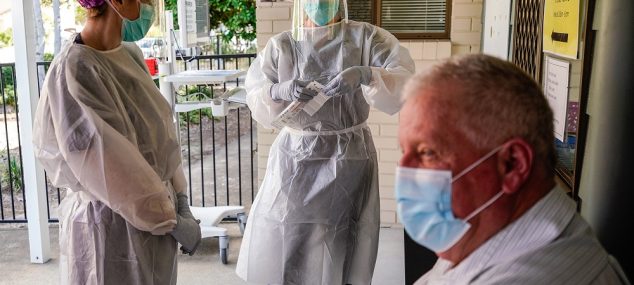
There are no new confirmed cases of COVID-19 reported among residents of Northern NSW Local Health District (NNSWLHD).
In the days since a confirmed case of COVID-19 was detected in a visitor to the region, community members in Northern NSW have responded in huge numbers to calls to get tested for COVID-19.
Over three days from Tuesday 10 August to Thursday 12 August, there were 7,299 tests conducted across the four hospital-based testing clinics and six drive through clinics from Grafton up to Tweed Heads.
On Tuesday 10 August, 2,837 tests were conducted at these sites, 2,317 on Wednesday 11 August and 2145 on Thursday 12 August.
These figures do not include the multiple other pathology, respiratory and GP testing clinics, and those numbers will be reported in weekly statistics in due course.
“We are extremely pleased with the high numbers of people turning out for testing across our region at the moment,” Acting Chief Executive NNSWLHD, Lynne Weir said.
“When you consider that in recent weeks, testing numbers have been up around 9,000 a week, these numbers we’re seeing at the moment are really encouraging.”
Additional testing clinics have been established this week, including new drive through clinics in Casino and Bangalow, to make it easier for residents to get tested.
While there have been some longer lines at clinics around the district, particularly at the drive throughs in Byron Bay and Tweed Heads, the time taken for people to receive their results remains around the 24-48 hr period.
“As has been the case throughout this pandemic, our public health response relies on immense team efforts, and we commend health staff right across the District on the commitment and skills they bring to work each day.”
Anyone who has even mild symptoms of COVID-19 should get tested immediately, then go home and self-isolate until they receive a negative result.
If you have been given specific advice by NSW Health, for example as a result of being a close contact of a confirmed case, please follow that advice to the letter.
Symptoms of COVID-19 can include a runny nose, scratchy or sore throat, cough, fever, shortness of breath, headache, tiredness, loss of taste or smell, nausea, diarrhoea or muscle aches.
All the local testing clinics and their opening hours are listed on the NSW government website at: https://www.nsw.gov.au/covid-19/how-to-protect-yourself-and-others/clinics or, you can also contact your GP.
Sewage Surveillance
Fragments of the virus that causes COVID-19 have been detected overnight in samples taken from the South Lismore sewage treatment plant on Wednesday 11 August.
Assistant Director North Coast Public Health Unit, Greg Bell, said this was to be expected, given the plant processes waste from the Lismore Base Hospital.
“We know the COVID-19 positive cases have been cared for at the hospital, which is why we’re now seeing these results detected in the sewage,” Mr Bell said.
“Of course, there may also be other undetected cases of COVID-19 in the community.
“Please keep in mind that, along with keeping to the stay at home orders in place at the moment, the best thing that people can do is to get tested immediately if they feel slightly unwell.”
There have been no other sewage detections in samples taken at collection sites across the District.
Additional sewage testing is being done in high risk areas, with the Bangalow, Byron Bay, Mullumbimby and Ocean Shores treatment plans currently being tested twice weekly. The most recent samples were taken at these sites on 9 and 10 August, all returning negative results.
Sewage testing will also commence this week at the Nimbin and Casino sewage treatment plants, while testing continues at other sites throughout Northern NSW as part of the regular program.
“Sewage testing can help provide early warning of undetected infections in an area,” Mr Bell said.
As well as being present in stools, viral fragments can enter the sewer when washed off hands and bodies through sinks and showers.
Usual sewage treatment processes inactivate, or kill, the COVID-19 virus.